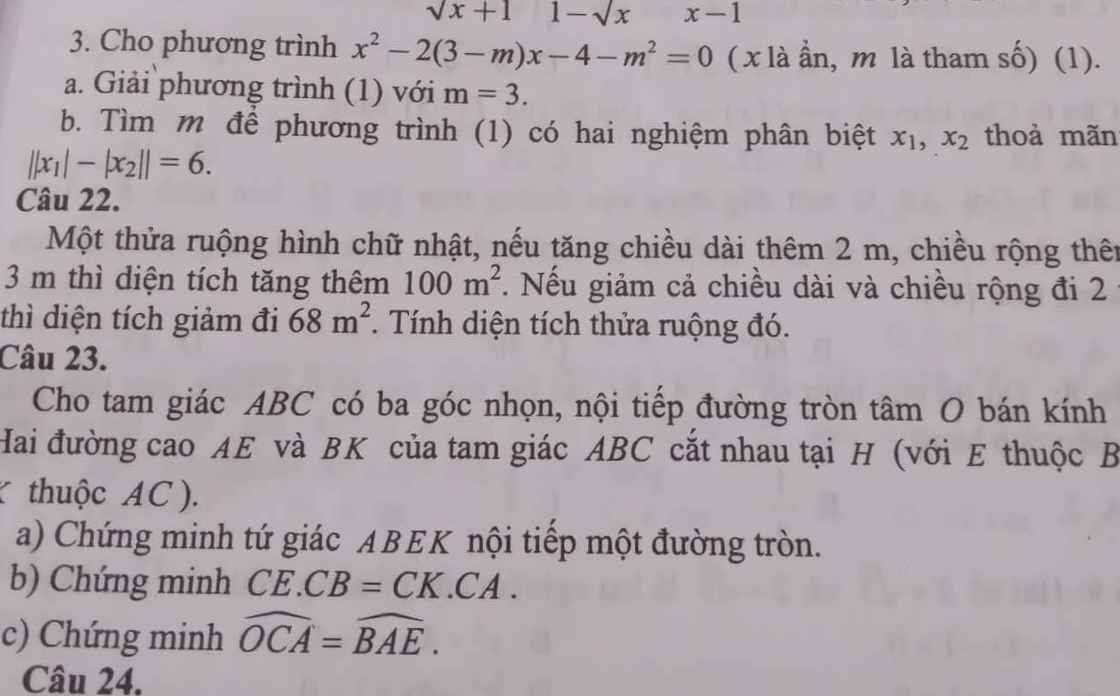Tìm m để pt có nghiệm \(\dfrac{x-m}{x+3}+\dfrac{x-3}{x+m}=2\)
Hãy nhập câu hỏi của bạn vào đây, nếu là tài khoản VIP, bạn sẽ được ưu tiên trả lời.



1.
\(4x^3-6x^2+m=0\Leftrightarrow4x^3-6x^2=-m\)
Xét hàm \(f\left(x\right)=4x^3-6x^2\)
\(f'\left(x\right)=12x^2-12x=0\Rightarrow\left[{}\begin{matrix}x=0\\x=1\end{matrix}\right.\)
BBT:
x y' y 0 1 0 0 - + + 0 -2
Từ BBT ta thấy đường thẳng \(y=-m\) cắt \(y=4x^3-6x^2\) tại 3 điểm pb khi:
\(-2< -m< 0\Leftrightarrow0< m< 2\)
2.
Pt hoành độ giao điểm:
\(\dfrac{x-3}{x+1}=x+m\)
\(\Rightarrow x-3=\left(x+m\right)\left(x+1\right)\)
\(\Leftrightarrow x^2+mx+m+3=0\) (1)
Đường thẳng cắt đồ thị tại 2 điểm pb khi và chỉ khi (1) có 2 nghiệm pb
\(\Leftrightarrow\Delta=m^2-4\left(m+3\right)>0\)
\(\Rightarrow\left[{}\begin{matrix}m>6\\m< -2\end{matrix}\right.\)

a, b bạn tự giải
c. \(\Delta=m^2+4>0;\forall m\Rightarrow\) pt luôn có nghiệm
Theo hệ thức Viet: \(\left\{{}\begin{matrix}x_1+x_2=m\\x_1x_2=-1\end{matrix}\right.\)
Ồ, đề câu d bạn ghi sai, 2 mẫu số phải có 1 cái là \(x_1\)

1.
\(a+b+c=0\) nên pt luôn có 2 nghiệm
\(\left\{{}\begin{matrix}x_1+x_2=m\\x_1x_2=m-1\end{matrix}\right.\)
\(A=\dfrac{2x_1x_2+3}{x_1^2+x_2^2+2x_1x_2+2}=\dfrac{2x_1x_2+3}{\left(x_1+x_2\right)^2+2}=\dfrac{2\left(m-1\right)+3}{m^2+2}=\dfrac{2m+1}{m^2+2}\)
\(A=\dfrac{m^2+2-\left(m^2-2m+1\right)}{m^2+2}=1-\dfrac{\left(m-1\right)^2}{m^2+2}\le1\)
Dấu "=" xảy ra khi \(m=1\)
2.
\(\Delta=m^2-4\left(m-2\right)=\left(m-2\right)^2+4>0;\forall m\) nên pt luôn có 2 nghiệm pb
Theo Viet: \(\left\{{}\begin{matrix}x_1+x_2=m\\x_1x_2=m-2\end{matrix}\right.\)
\(\dfrac{\left(x_1^2-2\right)\left(x_2^2-2\right)}{\left(x_1-1\right)\left(x_2-1\right)}=4\Rightarrow\dfrac{\left(x_1x_2\right)^2-2\left(x_1^2+x_2^2\right)+4}{x_1x_2-\left(x_1+x_2\right)+1}=4\)
\(\Rightarrow\dfrac{\left(x_1x_2\right)^2-2\left(x_1+x_2\right)^2+4x_1x_2+4}{x_1x_2-\left(x_1+x_2\right)+1}=4\)
\(\Rightarrow\dfrac{\left(m-2\right)^2-2m^2+4\left(m-2\right)+4}{m-2-m+1}=4\)
\(\Rightarrow-m^2=-4\Rightarrow m=\pm2\)

PT có 2 nghiệm `<=> \Delta' >0 <=> 2^2-1.(m+1)>0<=> m<3`
Viet: `x_1+x_2=-4`
`x_1 x_2=m+1`
`(x_1)/(x_2)+(x_2)/(x_1)=10/3`
`<=> (x_1^2+x_2^2)/(x_1x_2)=10/3`
`<=> ((x_1+x_2)^2-2x_1x_2)/(x_1x_2)=10/3`
`<=> (4^2-2(m+1))/(m+1)=10/3`
`<=> m=2` (TM)
Vậy `m=2`.

a: \(\text{Δ}=\left(2m+1\right)^2-4m\left(m+3\right)\)
\(=4m^2+4m+1-4m^2-12m\)
\(=-8m+1\)
Để phương trình có hai nghiệm phân biệt thì Δ>0
\(\Leftrightarrow-8m+1>0\)
\(\Leftrightarrow-8m>-1\)
hay \(m< \dfrac{1}{8}\)

\(1.\left(x\ne\pm1\right)\Rightarrow pt\Leftrightarrow\left(x-m\right)\left(x-1\right)=\left(x+1\right)\left(x-2\right)\)
\(\Leftrightarrow x^2-x\left(m+1\right)+m=x^2-x-2\)
\(\Leftrightarrow-x\left(m+1\right)+m=-x-2\)
\(\Leftrightarrow x=\dfrac{m+2}{m}\left(m\ne0\right)\)
\(pt-có-ngo-duy-nhất\Leftrightarrow\left\{{}\begin{matrix}\dfrac{m+2}{m}\ne1\\\dfrac{m+2}{m}\ne-1\end{matrix}\right.\)\(\Leftrightarrow m\ne-1\)
\(\Rightarrow\left\{{}\begin{matrix}m\ne0\\m\ne-1\end{matrix}\right.\)
\(2.\left\{{}\begin{matrix}x^2+8y^2=12\left(1\right)\\x^3+2xy^2+12y=0\left(2\right)\end{matrix}\right.\)
\(\left(2\right)\Leftrightarrow x^3+2xy^2+y\left(x^2+8y^2\right)=0\)
\(\Leftrightarrow\left(x+2y\right)\left(x^2-xy+4y^2\right)=0\Leftrightarrow\left[{}\begin{matrix}x=-2y\left(3\right)\\x^2-xy+4y^2=\left(x-\dfrac{y}{2}\right)^2+\dfrac{15}{4}y^2=0\left(4\right)\end{matrix}\right.\)
\(\left(3\right)\left(1\right)\Rightarrow4y^2+8y^2=12\Leftrightarrow\left[{}\begin{matrix}y=1\Rightarrow x=-2\\y=-1\Rightarrow x=2\end{matrix}\right.\)
với \(x=y=0\) không là nghiệm của hệ pt
với \(x=y\ne0\Rightarrow\left(4\right)>0\Rightarrow\left(4\right)-vô-nghiệm\)
\(\Rightarrow\left(x;y\right)=\left\{\left(-2;1\right);\left(2;-1\right)\right\}\)
\(1,\Leftrightarrow\left(x-m\right)\left(x-1\right)=x^2-x-2\\ \Leftrightarrow x^2-x-mx+m-x^2+x+2=0\\ \Leftrightarrow mx=m+2\)
PT có nghiệm duy nhất \(\Leftrightarrow m\ne0\)
\(2,\Leftrightarrow\left\{{}\begin{matrix}x^2y+8y^3=12y\\x^3+2xy^2+12y=0\end{matrix}\right.\)
Thế \(PT\left(1\right)\rightarrow PT\left(2\right)\Leftrightarrow x^3+2xy^2+x^2y+8y^3=0\)
\(\Leftrightarrow\left(x+2y\right)\left(x^2-2xy+4y^2\right)+xy\left(x+2y\right)=0\\ \Leftrightarrow\left(x+2y\right)\left(x^2-xy+4y^2\right)=0\\ \Leftrightarrow\left[{}\begin{matrix}x=-2y\\\left(x-\dfrac{1}{2}y\right)^2+\dfrac{15}{4}y^2=0\end{matrix}\right.\Leftrightarrow\left[{}\begin{matrix}x=-2y\\\left\{{}\begin{matrix}x-\dfrac{1}{2}y=0\\y^2=0\end{matrix}\right.\end{matrix}\right.\Leftrightarrow\left[{}\begin{matrix}x=-2y\\x=y=0\end{matrix}\right.\)
Thay \(x=y=0\Leftrightarrow0+0=12\left(loại\right)\)
Thay \(x=-2y\Leftrightarrow4y^2+8y^2=12y^2=12\Leftrightarrow\left[{}\begin{matrix}y=1\Rightarrow x=-2\\y=-1\Rightarrow x=2\end{matrix}\right.\)
Vậy \(\left(x;y\right)\in\left\{\left(-2;1\right);\left(2;-1\right)\right\}\)

\(\Delta=\left(2m-3\right)^2-4\left(2m-4\right)=\left(2m-5\right)^2\ge0;\forall m\)
Pt luôn có 2 nghiệm với mọi m
Theo hệ thức Viet: \(\left\{{}\begin{matrix}x_1+x_2=2m-3\\x_1x_2=2m-4\end{matrix}\right.\)
\(\dfrac{1}{x_1}+\dfrac{1}{x_2}=\dfrac{1}{2}\)
\(\Leftrightarrow\dfrac{x_1+x_2}{x_1x_2}=\dfrac{1}{2}\)
\(\Leftrightarrow\dfrac{2m-3}{2m-4}=\dfrac{1}{2}\)
\(\Rightarrow4m-6=2m-4\)
\(\Leftrightarrow2m=2\)
\(\Leftrightarrow m=1\) (thỏa mãn)
